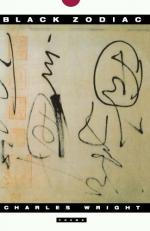|
This section contains 2,035 words (approx. 7 pages at 300 words per page) |

|
SOURCE: “Poetry and Silence at the End of the Century,” in Salmagundi, No. 111, Summer, 1996, pp. 195-207.
In the following excerpt, Bedient discusses Wright's explorations of language and existential silence, or nothingness, in Chickamauga and previous works.
Our print-besmeared and bomb-shrill century has made silence more acute than ever before. It has made of silence a crisis. At the century's end, two American poets, Carolyn Forché and Charles Wright, stand out for their preoccupation with it, a preoccupation so profound that their poetry, like T. S. Eliot's, approximates prayer.
There is between these two poets an almost clean division of labor. If by the end of the century silence has become polarized beyond any extremes known before, Forché's The Angel of History is the great work on the silence at the pole of the appalled and the disappeared, and Charles Wright's many books a great body of work...
|
This section contains 2,035 words (approx. 7 pages at 300 words per page) |

|


